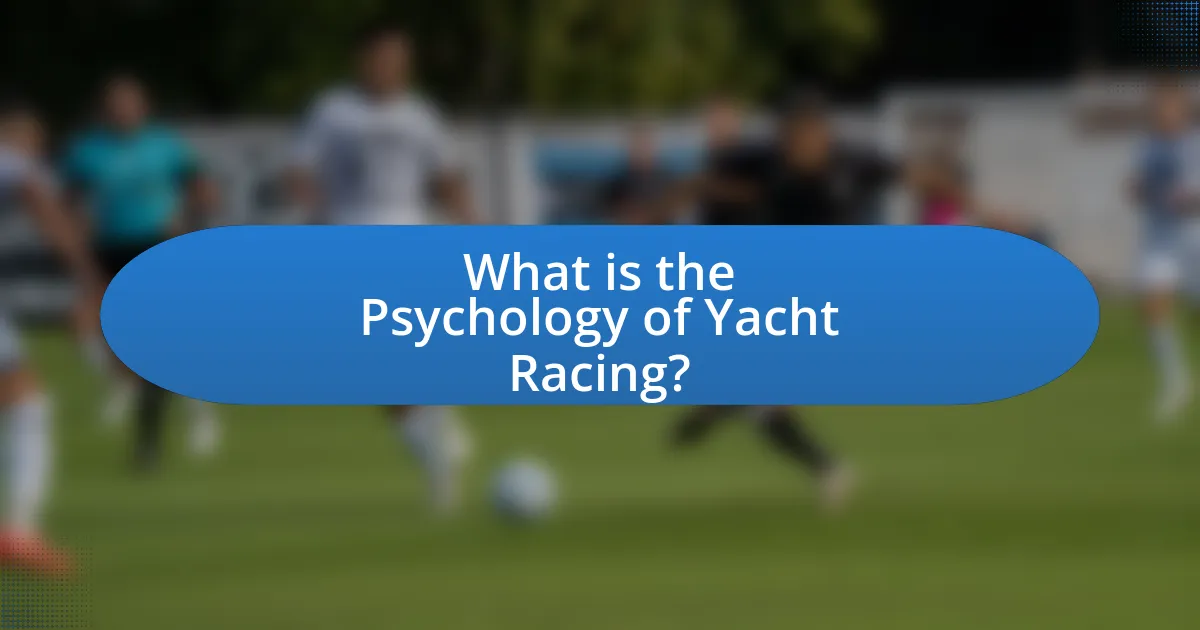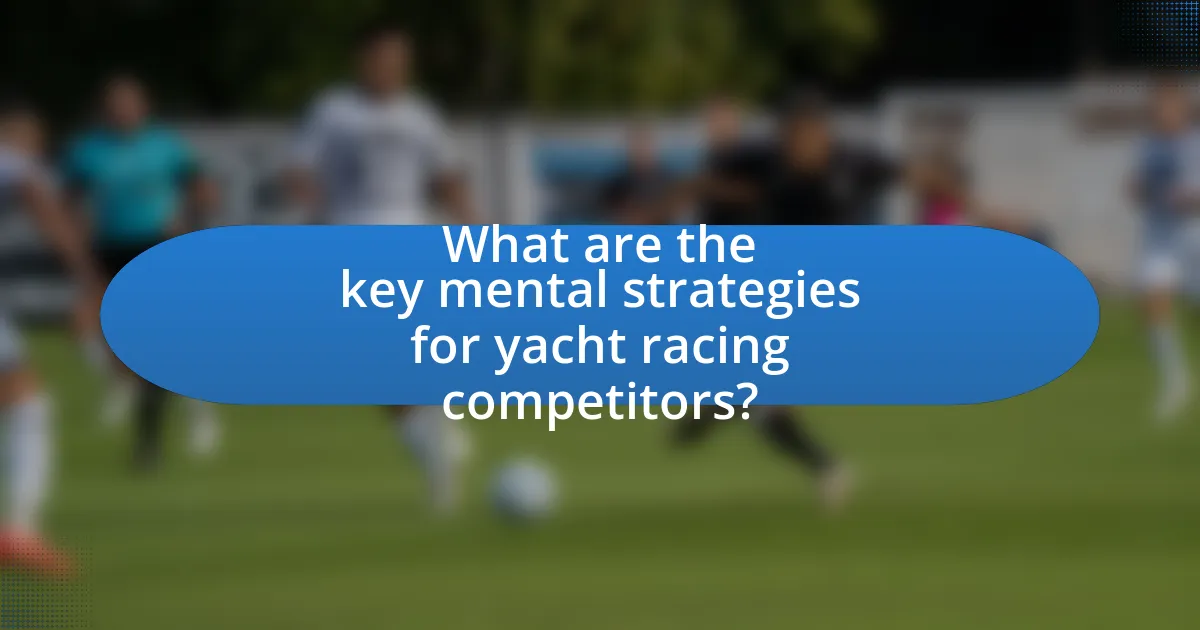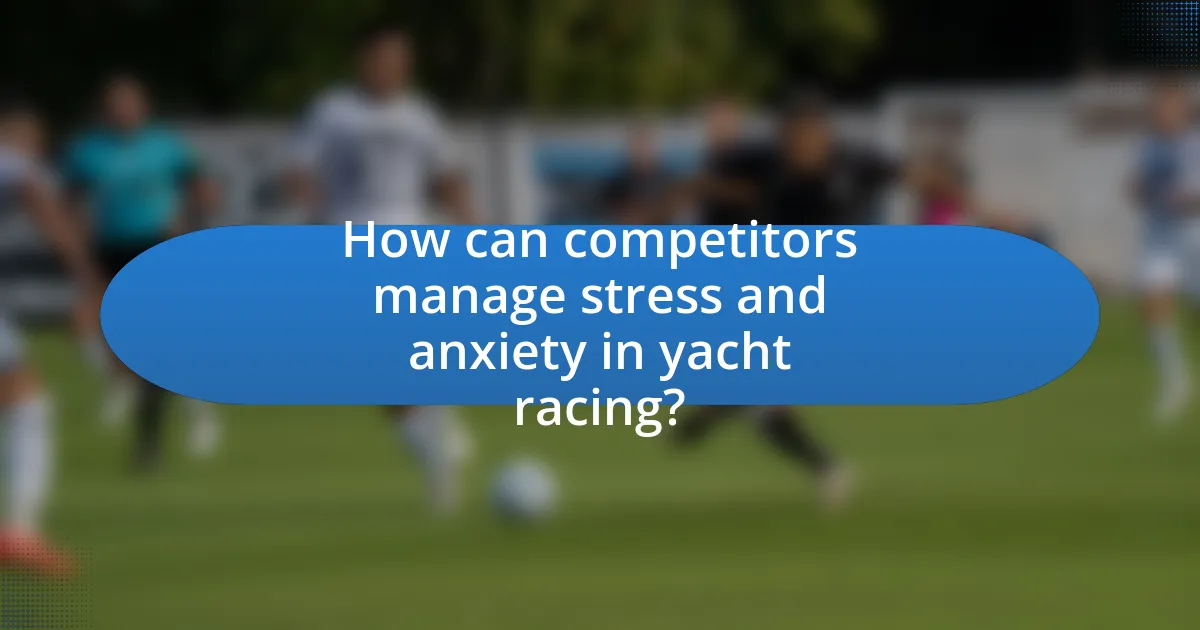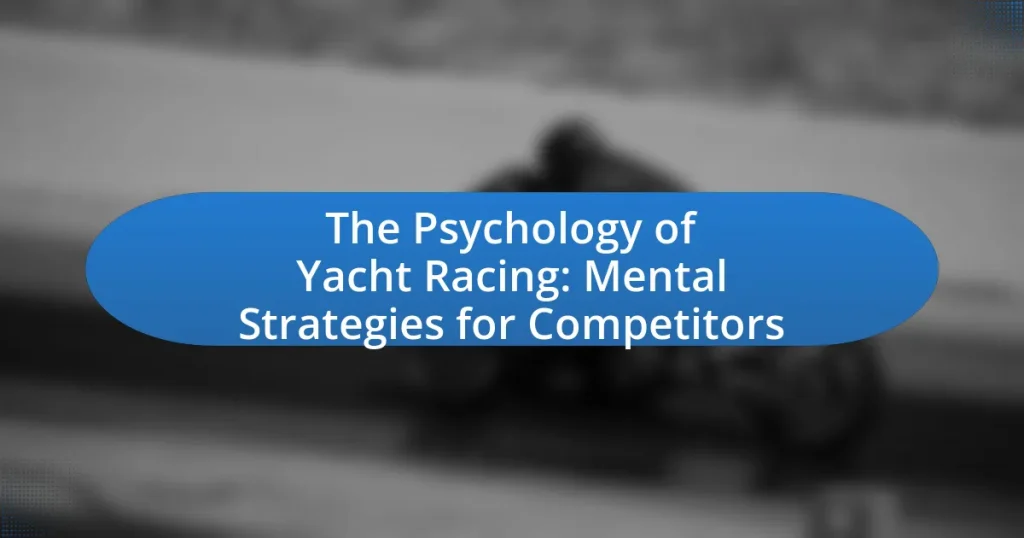The main entity of the article is the psychology of yacht racing, which explores the mental processes and strategies that competitors utilize to enhance their performance and manage stress during races. Key topics include the influence of psychological factors on decision-making, emotional regulation, and team dynamics, as well as essential mental skills such as focus, resilience, and confidence. The article also discusses effective mental preparation techniques, including visualization, goal-setting, and mindfulness, which are crucial for improving performance in high-pressure environments. Additionally, it addresses the impact of emotions on decision-making, the importance of teamwork and communication, and practical tips for maintaining mental resilience during competitions.

What is the Psychology of Yacht Racing?
The psychology of yacht racing involves understanding the mental processes and strategies that competitors use to enhance performance and manage stress during races. This includes elements such as focus, decision-making, and emotional regulation, which are critical in high-pressure environments like competitive sailing. Research indicates that successful yacht racers often employ visualization techniques, goal-setting, and mindfulness practices to maintain concentration and cope with the unpredictability of weather and competition. For instance, a study published in the Journal of Sports Psychology highlighted that elite sailors utilize mental imagery to rehearse race scenarios, which improves their confidence and performance under pressure.
How does psychology influence performance in yacht racing?
Psychology significantly influences performance in yacht racing by affecting decision-making, stress management, and team dynamics. Competitors often face high-pressure situations that require quick, strategic choices; psychological resilience enables them to maintain focus and clarity under stress. Research indicates that mental preparation techniques, such as visualization and self-talk, enhance performance by improving concentration and reducing anxiety. For instance, a study published in the Journal of Sports Sciences found that athletes who practiced visualization techniques showed a 20% improvement in performance metrics compared to those who did not. Additionally, effective communication and trust among team members, rooted in psychological principles, can lead to better coordination and execution of racing strategies.
What mental skills are essential for successful yacht racing?
Successful yacht racing requires mental skills such as focus, decision-making, and resilience. Focus enables sailors to concentrate on the race, minimizing distractions from the environment and competitors. Decision-making is crucial for assessing wind conditions, course adjustments, and tactical maneuvers, often under time pressure. Resilience helps competitors cope with setbacks, such as equipment failure or poor performance, allowing them to maintain motivation and adapt strategies. These skills are supported by research indicating that elite athletes often excel in these areas, enhancing their performance under competitive conditions.
How do emotions impact decision-making during races?
Emotions significantly impact decision-making during races by influencing cognitive processes and behavioral responses. For instance, heightened anxiety can lead to overthinking and hesitation, causing competitors to miss critical opportunities or make poor tactical choices. Conversely, positive emotions like excitement can enhance focus and confidence, enabling quicker and more decisive actions. Research indicates that emotional states can alter risk perception; competitors experiencing fear may avoid aggressive maneuvers, while those feeling confident may take calculated risks that can lead to victory. This interplay between emotions and decision-making is crucial in yacht racing, where split-second choices can determine the outcome.
Why is mental preparation important for yacht racers?
Mental preparation is crucial for yacht racers because it enhances focus, decision-making, and stress management during competitions. Effective mental strategies allow racers to maintain composure in high-pressure situations, which is essential for optimal performance. Research indicates that athletes who engage in mental training techniques, such as visualization and mindfulness, experience improved outcomes; for instance, a study published in the Journal of Sports Psychology found that mental imagery significantly boosts performance in competitive sailing scenarios. This evidence underscores the importance of mental preparation in achieving success in yacht racing.
What techniques can be used for effective mental preparation?
Effective mental preparation techniques include visualization, goal setting, and mindfulness. Visualization involves mentally rehearsing scenarios to enhance performance, which has been shown to improve outcomes in competitive sports, including yacht racing. Goal setting helps competitors define clear, achievable objectives, fostering motivation and focus; research indicates that specific and challenging goals lead to higher performance levels. Mindfulness practices, such as meditation, enhance concentration and reduce anxiety, contributing to improved decision-making under pressure. These techniques collectively support mental resilience and readiness in high-stakes environments like yacht racing.
How does visualization enhance racing performance?
Visualization enhances racing performance by allowing athletes to mentally rehearse their actions and strategies, leading to improved focus and execution during actual races. This mental practice helps competitors create a clear mental image of their desired outcomes, which can enhance confidence and reduce anxiety. Research indicates that athletes who engage in visualization techniques can experience performance improvements of up to 20%, as it activates similar neural pathways as physical practice, reinforcing muscle memory and decision-making skills.

What are the key mental strategies for yacht racing competitors?
Key mental strategies for yacht racing competitors include visualization, focus, and emotional regulation. Visualization allows competitors to mentally rehearse race scenarios, enhancing their preparedness and confidence. Focus helps sailors maintain concentration on critical tasks, such as sail trim and course adjustments, which is essential for performance under pressure. Emotional regulation enables competitors to manage stress and anxiety, ensuring they remain calm and make rational decisions during high-stakes situations. These strategies are supported by research indicating that mental preparation significantly impacts performance outcomes in competitive sports, including sailing.
How can competitors develop focus and concentration?
Competitors can develop focus and concentration through structured mental training techniques such as visualization, mindfulness, and goal-setting. Visualization involves mentally rehearsing scenarios to enhance performance and maintain focus during races. Mindfulness practices, such as meditation, help competitors stay present and reduce distractions, which is crucial in high-pressure environments like yacht racing. Goal-setting provides clear objectives, allowing competitors to concentrate on specific tasks and outcomes, thereby improving their overall performance. Research indicates that athletes who engage in these mental strategies experience enhanced focus and improved competitive outcomes, as evidenced by studies in sports psychology that highlight the effectiveness of mental training in performance enhancement.
What exercises can improve mental focus during races?
Exercises that can improve mental focus during races include visualization techniques, mindfulness meditation, and concentration drills. Visualization involves mentally rehearsing race scenarios, which enhances focus and prepares the mind for competition. Mindfulness meditation trains the brain to maintain attention on the present moment, reducing distractions and improving overall concentration. Concentration drills, such as focusing on a single object or performing tasks under timed conditions, help sharpen attention skills. Research indicates that athletes who practice these techniques often experience enhanced performance due to improved mental clarity and focus during high-pressure situations.
How does mindfulness contribute to better racing outcomes?
Mindfulness contributes to better racing outcomes by enhancing focus, reducing anxiety, and improving decision-making under pressure. When sailors practice mindfulness, they cultivate an awareness of their thoughts and emotions, allowing them to remain present and engaged during races. Research indicates that mindfulness training can lead to improved performance metrics; for instance, a study published in the Journal of Sport Psychology in Action found that athletes who engaged in mindfulness practices reported lower levels of stress and higher levels of concentration, which directly correlated with improved performance outcomes. This mental clarity enables competitors to make quicker, more effective decisions, ultimately leading to better racing results.
What role does confidence play in yacht racing?
Confidence plays a crucial role in yacht racing by directly influencing a sailor’s decision-making and performance under pressure. High confidence levels enable sailors to trust their instincts, make quick tactical decisions, and maintain composure in challenging conditions, which is essential for success in competitive racing. Research indicates that athletes with greater self-confidence tend to perform better, as they are more likely to take calculated risks and push their limits, leading to improved outcomes in races. For instance, a study published in the Journal of Sports Psychology found that self-efficacy, a component of confidence, significantly correlates with performance in various sports, including sailing.
How can competitors build and maintain confidence?
Competitors can build and maintain confidence by setting achievable goals and consistently evaluating their performance. By establishing specific, measurable objectives, competitors create a clear path for success, which fosters a sense of accomplishment. Regular self-assessment allows competitors to identify strengths and areas for improvement, reinforcing their belief in their abilities. Research indicates that athletes who engage in goal-setting and self-reflection report higher levels of confidence and performance (Weinberg & Gould, 2014). This structured approach not only enhances self-efficacy but also prepares competitors to handle challenges effectively, further solidifying their confidence in competitive environments.
What are the effects of self-talk on performance?
Self-talk significantly influences performance by enhancing focus, motivation, and self-confidence. Research indicates that positive self-talk can lead to improved athletic performance, as it helps athletes manage anxiety and maintain concentration during high-pressure situations. For instance, a study published in the Journal of Sports Sciences by Thelwell et al. (2010) found that athletes who engaged in positive self-talk experienced better performance outcomes compared to those who did not. This effect is attributed to the ability of self-talk to reinforce a positive mindset, which is crucial in competitive environments like yacht racing.

How can competitors manage stress and anxiety in yacht racing?
Competitors can manage stress and anxiety in yacht racing through techniques such as visualization, mindfulness, and structured routines. Visualization involves mentally rehearsing race scenarios, which can enhance confidence and reduce anxiety by familiarizing competitors with potential challenges. Mindfulness practices, such as focused breathing and meditation, help competitors stay present and mitigate overwhelming thoughts during high-pressure situations. Additionally, establishing structured routines before and during races can create a sense of control and predictability, further alleviating stress. Research indicates that athletes who employ these mental strategies report lower levels of anxiety and improved performance outcomes, demonstrating their effectiveness in competitive environments.
What are common sources of stress for yacht racers?
Common sources of stress for yacht racers include intense competition, unpredictable weather conditions, and the pressure of teamwork. Intense competition creates high stakes, leading to anxiety about performance and outcomes. Unpredictable weather can affect race strategies and safety, adding to the mental burden. Additionally, the need for effective communication and coordination among team members can lead to interpersonal conflicts and stress, particularly in high-pressure situations. These factors collectively contribute to the psychological challenges faced by yacht racers during competitions.
How can competitors identify and address their stressors?
Competitors can identify and address their stressors by conducting self-assessments and utilizing mental strategies such as mindfulness and visualization. Self-assessments involve reflecting on personal experiences and emotions during races to pinpoint specific stressors, such as performance pressure or environmental factors. Mindfulness practices help competitors stay present and reduce anxiety, while visualization techniques allow them to mentally rehearse successful outcomes, thereby mitigating stress. Research indicates that athletes who engage in these mental strategies report lower stress levels and improved performance, demonstrating their effectiveness in addressing competitive stressors.
What relaxation techniques can be beneficial before and during races?
Breathing exercises and visualization techniques are beneficial relaxation methods before and during races. Breathing exercises, such as deep diaphragmatic breathing, help reduce anxiety and improve focus by increasing oxygen flow and calming the nervous system. Visualization techniques involve mentally rehearsing successful race scenarios, which can enhance confidence and performance by creating a positive mindset. Research indicates that athletes who practice these techniques experience lower stress levels and improved performance outcomes, as evidenced by studies showing a correlation between mental preparation and competitive success in sports.
How does teamwork and communication affect racing psychology?
Teamwork and communication significantly enhance racing psychology by fostering a cohesive environment that improves performance under pressure. Effective communication among team members ensures that strategies are clearly understood and executed, which is crucial in high-stakes racing scenarios. Research indicates that teams with strong communication skills experience reduced anxiety and increased confidence, leading to better decision-making during races. For instance, a study published in the Journal of Sports Psychology found that synchronized communication among crew members in yacht racing correlates with improved race outcomes, demonstrating the psychological benefits of teamwork in competitive settings.
What strategies can improve team dynamics on a yacht?
Effective strategies to improve team dynamics on a yacht include fostering open communication, establishing clear roles, and conducting regular team-building activities. Open communication encourages crew members to express concerns and ideas, which enhances collaboration and trust. Establishing clear roles ensures that each member understands their responsibilities, reducing confusion and increasing efficiency during operations. Regular team-building activities, such as drills or social events, strengthen relationships and improve teamwork, leading to better performance under pressure. These strategies are supported by research indicating that cohesive teams with defined roles and strong communication outperform less organized groups in high-stakes environments, such as yacht racing.
How can effective communication enhance performance under pressure?
Effective communication enhances performance under pressure by facilitating clear understanding and coordination among team members. In high-stress situations, such as yacht racing, effective communication ensures that all crew members are aligned on strategies, roles, and immediate actions, which is crucial for executing complex maneuvers quickly and efficiently. Research indicates that teams with strong communication skills experience improved decision-making and reduced errors, leading to better overall performance. For instance, a study published in the Journal of Applied Psychology found that teams with effective communication were 25% more likely to achieve their performance goals in high-pressure environments.
What practical tips can yacht racing competitors implement for better mental performance?
Yacht racing competitors can enhance their mental performance by implementing techniques such as visualization, mindfulness, and goal-setting. Visualization involves mentally rehearsing race scenarios, which has been shown to improve focus and reduce anxiety, as evidenced by studies indicating that athletes who visualize their performance often achieve better results. Mindfulness practices, such as deep breathing and meditation, help competitors maintain composure under pressure, leading to improved decision-making during races. Additionally, setting specific, measurable, achievable, relevant, and time-bound (SMART) goals can provide clear direction and motivation, which is supported by research demonstrating that goal-setting enhances performance in competitive sports.
How can competitors create a personalized mental training plan?
Competitors can create a personalized mental training plan by assessing their individual strengths, weaknesses, and specific racing scenarios. This involves conducting a self-evaluation to identify mental skills such as focus, confidence, and stress management that need improvement. Research indicates that tailored mental training programs, which include visualization techniques, goal setting, and mindfulness practices, enhance performance in high-pressure environments like yacht racing. For instance, a study published in the Journal of Sports Psychology found that athletes who engaged in personalized mental training showed a 20% improvement in performance metrics compared to those who did not. By integrating these elements into their training, competitors can effectively enhance their mental resilience and adaptability on the water.
What are the best practices for maintaining mental resilience during competitions?
The best practices for maintaining mental resilience during competitions include developing a strong pre-competition routine, practicing mindfulness, and fostering a positive mindset. A pre-competition routine helps athletes establish consistency and control, reducing anxiety and enhancing focus. Mindfulness techniques, such as deep breathing and visualization, allow competitors to stay present and manage stress effectively. Additionally, cultivating a positive mindset through affirmations and reframing negative thoughts can improve overall performance. Research indicates that athletes who engage in these practices report higher levels of confidence and lower levels of performance anxiety, which supports their mental resilience during high-pressure situations.


